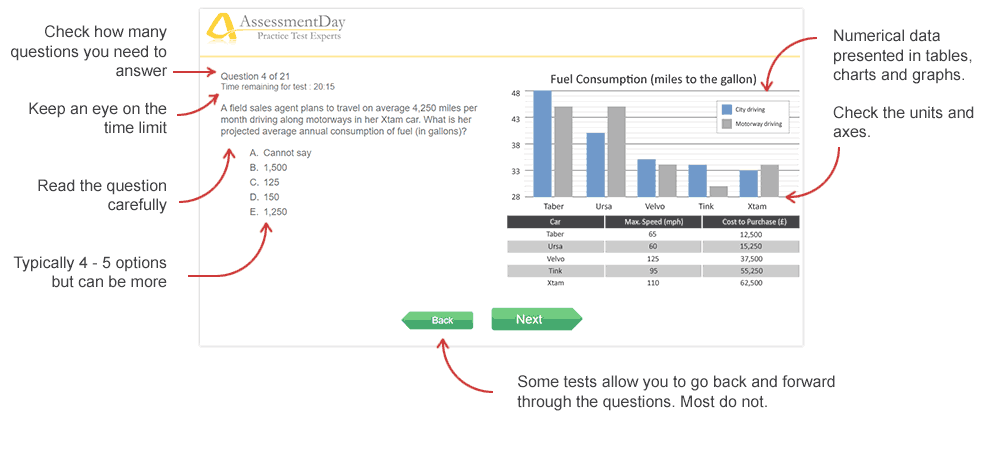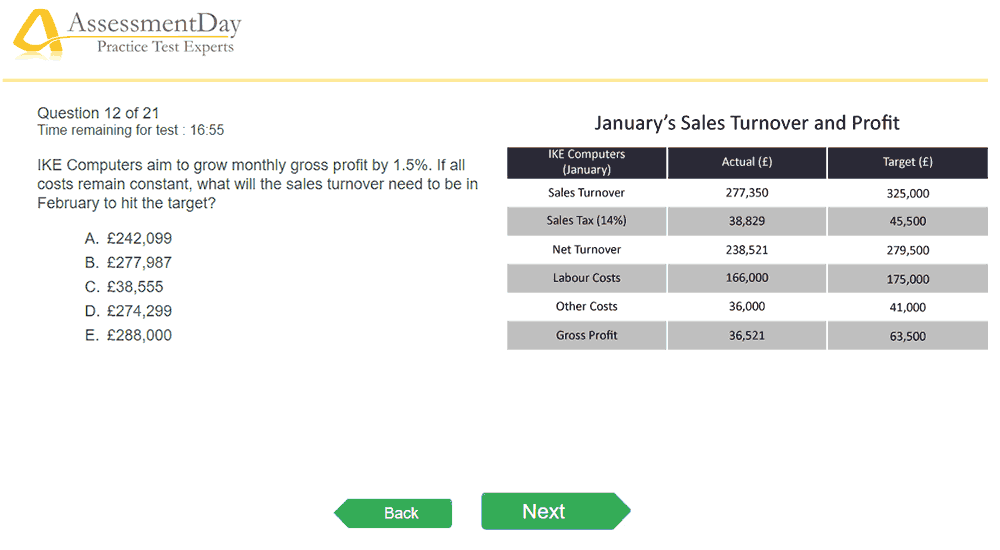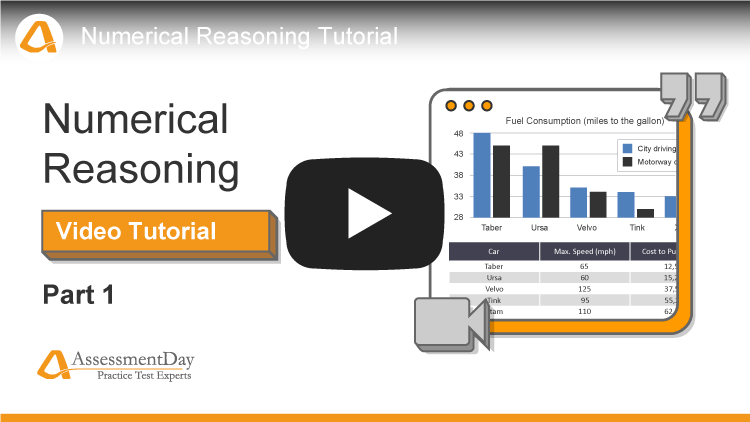Numerical Reasoning Tests
Practice tests, solutions, and tips to help you pass employers' numerical reasoning tests.



Updated:
It's a competitive job market out there, and employers are increasingly turning to numerical tests to help them make choices about whom to invite to interview.
Our practice tests are created by the same psychologists who design tests for the likes of SHL, Kenexa, Talent Q, and Saville Assessment. So our test platform and example questions will give you a good feel for the numerical tests employers use. Performing your best in your numerical reasoning test is all about practice, and knowing what to expect!
Page contents:
Jump to:- What is a numerical reasoning test?
- What to know before your test
- Numerical reasoning video tutorial
- Free numerical reasoning test
- What level of maths do I need?
- Most common numerical tests used
- Preparing for your numerical test
- Numerical reasoning top tips
- Effective strategies for numerical tests
- Your rights as a test-taker
- When are numerical tests used?
- Numerical reasoning' FAQs
Looking to hire?
We recommend Test Partnership for companies seeking reliable hiring tests.

What is a numerical reasoning test?
A numerical reasoning test is used to assess a candidate's ability to handle and interpret numerical data. You will be required to analyse and draw conclusions from the data, which may be presented in the form of tables or graphs. The tests are timed and in a multiple choice format.
Did You Know?
If you're doing an online application it's likely you'll have to sit a numerical reasoning test as they're an extremely popular test for employers to use.
Numerical reasoning tests differ from the sort of numerical tests you may be familiar with from GCSE or A level exams. The tests you will face are designed to measure your ability to problem solve, often mimicking the type of analysis you will be required to undertake in your future role e.g. Comparing the productivity of two different branches of a company. This type of workplace numerical data can often be tricky to understand if you are not familiar with it, so it's extremely important to take practice tests to familiarise yourself with these beforehand.
The following images explain the format of an example numerical reasoning question:


What you should know before taking your numerical reasoning test
With thousands of job applicants to choose from, it's common for employers to use aptitude testing to sift the good candidates from the mediocre. The most common way for employers to use numerical reasoning tests is online, after they have accepted your CV or initial application form. If you pass your online test larger employers tend to then invite you to an assessment centre. Often employers ask you to sit a repeat test at the assessment centre to verify that you are indeed the same person who scored that great score on the online test, so don't get your friends to help with your online test! The best way to familiarise yourself with these tests is to take one of our free example numerical reasoning tests below.
As well as taking example tests, you should read the advice and findings below on how these tests work and what they measure.
PRO TIP!
By taking example numerical reasoning tests you will become familiar with the question format. Luckily for you most employers use a similar format of numerical reasoning test, which means it's easy to get some realistic practice beforehand.
The great thing about the numerical reasoning tests used for employment selection is that they are not the same as a maths test. You don't have to remember complex formulae or write long proofs. The important characteristics of a numerical reasoning test are:
- Multiple choice answers: - no longhand answers or showing your working-out.
- No prior knowledge required: - no uncommon equations to memorise (or surreptitiously write on your arm).
- Strict time limits: - some are generous while some are very short.
- Relevant to the workplace: - modern tests are based on the kind of numerical information you would deal with in the job.
- Based on only the information given: - you should not make assumptions about data you are not given.
Numerical reasoning video tutorial - part 1
The following video is part 1 of our two part tutorial whereby we guide you through numerical reasoning questions highlighting the things to look out for:

Free practice numerical reasoning test
Free Numerical Reasoning Test
FreeThis shortened free numerical reasoning test contains 12 questions and has a time limit of 12 minutes.
Numerical Reasoning Test 1
Premium- 30 questions
- 30 mins
Numerical Reasoning Test 2
PremiumNumerical Reasoning Test 3
PremiumNumerical Reasoning Test 4
PremiumWhat maths do I need to know for my numerical reasoning test?
It's easy to be fearful of numerical tests as it's often believed the maths involved will be very complex, however, this is not the case. The tricky part is interpreting the numerical data and figuring out what calculation is required, under the pressure of the count-down timer. You will be asked questions involving the following 7 core mathematical principles:
- Addition
- Subtraction
- Multiplication
- Division
- Percentages (including percentage changes)
- Ratios
- Averages
Key takeaway
If you don't feel comfortable with any of these questions, focus your practice on that type of question. You could also dig out your GCSE notes if you still have them. And remember you can use your calculator and notes to help you if you're taking this online. We have over 700 numerical practice questions that are available to you to help remove any weaknesses you may have.
Try to work both quickly and accurately during your test. Most tests don't employ negative marking but do check the instructions before you start. Whilst they might not tell you, bear in mind that your accuracy score is visible to the employer, so guessing answers will result in a low accuracy score and may suggest to the employer that your numerical work is prone to error.
Research has shown that people who do well in their numerical reasoning test tend to perform better in the job. That's precisely why employers use them!
Graduate and professional level numerical reasoning tests are the most difficult, reflecting the calibre of candidate they are trying to select. They still use only the seven basic maths skills listed above but they require you to analyse and interpret more advanced data, and they have several steps to the same question.
Start practising quality tests with a free account
Practice makes perfect
- Learn from detailed solutions
- Track your progress

The most common numerical reasoning tests used by employers
When you are invited by an employer to take a numerical reasoning test, try asking which test publisher they are using. You can then go to that test publisher's website to get more information and possibly example test questions. Some HR staff are surprisingly helpful with this.
To help with this, we have conducted some market research, and from our 2020 data found that SHL are the most popular test publisher for hiring companies to use:

If you are taking a numerical reasoning test in the UK, the chances are it will be written by one of those companies; we have a breakdown of the popular companies below:
- 1. SHL Verify Ability Tests - SHL are the most widely used test publisher so you are likely to come across their tests during your job hunt. Their numerical tests have a time limit of between 17 and 25 minutes so you will need to work quickly and accurately to perform well.
- 2. Kenexa Ability Tests - Kenexa are part of IBM and are another large test publisher. Their numerical tests look to the candidate very similar to those from SHL. So if you practice for a Kenexa numerical test, you will be well prepared for an SHL test, and vice versa. Kenexa typically allow candidates 20 minutes to answer 24 questions.
- 3. Test Partnership Numerical Reasoning - These numerical reasoning tests are adaptive, which means the questions get easier or harder depending on your previous question performance. Harder questions are worth more than easier questions and this allows for a more precise assessment. These tests consist of 15 questions with a time limit of 15 minutes.
- 4. Talent Q Elements Numerical Ability - These tests are also adaptive. A typical time limit is 90 seconds for questions with a fresh set of information and 75 seconds per question after that. Also the number of multiple choice options is a lot greater compared with what you might be used to from SHL, making it more difficult to make a best guess.
- 5. Cubiks Reasoning for Business - Designed to test candidates' business-orientated numerical reasoning skills. You usually get less than a minute per question.
- 6. TalentLens Rust Advanced Numerical Reasoning Appraisal (RANRA) - Aims to measure deduction and evaluation skills as well as numerical ability. Time limit 20 minutes. This test is often given in combination with the Watson Glaser Critical Thinking Appraisal.
- 7. TalentLens Athena Numerical Reasoning Assessment- One of the few tests which used advanced Item Response Theory. Contains 21 questions and has a time limit of 30 minutes. One of the key differentiators here is that candidates have to enter their answers in a free-text field box instead of picking from multiple choice options. So type carefully!
- 8. Cappfinity Numerical Reasoning Test - A unique mixture of numerical questions. There are multiple choice, drop-down multiple choice, ranking, open text field, and drag-and-drop style question. With 15 questions in 15 minutes, you have a fair amount of time for each question. But the diversity of question stlyes can make this test challenging.
- 9. Bespoke numerical tests - Many larger companies prefer to have their own tests created which closely match the situations candidates can expect in the job role. These tests vary slightly in style and time limit but you will still benefit from practising the industry-standard tests we have on offer.
If you are wishing to apply to a certain company then you may find our companies profile index useful. We have the collection of test-types you are likely to face if you are applying for 60 of the top employers.
Preparing for your numerical reasoning test
The most important way to prepare for your test is to take practice questions because this will reduce the element of surprise and will allow you to perform to your true ability. But don't stop there; adopt these test-taking techniques to really make sure you shine on the day.
- Practice - Practice does make perfect!
- Find out more about the test - Ask the employer which test you are taking and if they have any practice material.
- Be calm and refreshed - When the clock is ticking you need to be 100% alert to pick up all the marks you can.
- Arrive in plenty of time - This only applies to tests you take at an assessment centre. You won't perform your best if you're flustered and out of breath.
The following video features Ben talking through our advice for tackling a numerical reasoning test: For further information check out our numerical reasoning test tips
Numerical Reasoning Masterclass - Top Tips [video]

How to answer numerical reasoning tests - effective strategies
There are numerous types of numerical reasoning test, and many of these are used interchangeably. These tests tend to be similar in their layout and methodology, but with subtle and important differences.
So, you've prepared for your numerical reasoning test, how should you approach the questions when you are taking your test for real? As well as practice, there are some strategies to think about which might help.
- 1. Listen to instructions carefully - Before your test begins the test administrator will read out the instructions. It is very important you pay attention to these and that you understand them. This is your opportunity to ask questions. You will not be allowed to ask questions once the test has started.
- 2. Get the most from practice questions - Before the test starts you usually have a few example questions. These are not timed but there to get familiar with the test layout. Take your time to understand these questions and feel free to ask questions at this stage.
- 3. Ignore other people - Don't let yourself become distracted by how quickly or slowly other people are answering the questions. It is important to focus on what you are doing.
- 4. Beware the multiple choice options - Most multiple aptitude tests have what are called distractors. These are options which are deliberately similar to the correct answer or the answer to a silly mistake. Beware of these; they are designed to test if you are reading the question properly.
Join those now working at top companies
Don't settle for 'try again next year'. Let us help you pass employer tests first time.
Try now for free
Your rights as a test-taker
It is in the interests of the employer to treat all applicants fairly; after all they don't want to overlook potential talent. Every employer must receive your informed consent to be tested, which in practice means providing you with information on:
- The nature of the test and what it is designed to measure.
- The relevance of the test to the job you are applying for.
- How the results of the test will be used in their selection decision.
- Who will have access to the results and how long will results be stored.
- Whether you will be provided with feedback after your test.
Should your test time be adjusted? For example candidates with disabilities are sometimes entitled to extra time to complete their test (this can include dyslexia). Some test publishers prefer to give all candidates the same time limit but then make a judgement on whether raw scores should be adjusted. Employers aim to be fair to all candidates and want to avoid being accused of positive or negative discrimination. If you do have a disability, get in touch with the test administrator and they will make sure you are treated fairly.
If you are not happy with anything you are being asked to do, make sure you say something before you sit your test; otherwise they might just think you want to make excuses for a perceived bad performance.
When are numerical reasoning tests used?
If a job requires working with numbers and numerical information, the employer would be sensible to use numerical psychometric testing to predict which candidates are likely to perform well in the role. If a role doesn't require strong numerical skills, the employer shouldn't be using a numerical test as a selection criteria.
From our study, we found that numerical reasoning tests are most commonly used early on in the application process, likely before you have had any interviews. This is because many aptitude tests are used as a means of reducing the size of large candidate pools by filtering out those with weaker cognitive ability.

We know how much importance employers place on numerical reasoning ability, we also know that performing your best under strict timed conditions can be difficult. That's why we want to open up the test process and let you know what to expect. Practice can mean the difference between securing that position and losing it.
Our practice tests will ensure that you're fully prepared for your real test, letting you relax and perform to the best of your ability. You'll have a much better idea of what to expect and will be able to get your numerical reasoning skills up to scratch, hopefully leaving you in a much better position than you would otherwise be.
So, if you're looking for a way to improve your aptitude test score, practice can help significantly. Since our practice tests are designed by experts, they could make all the difference.